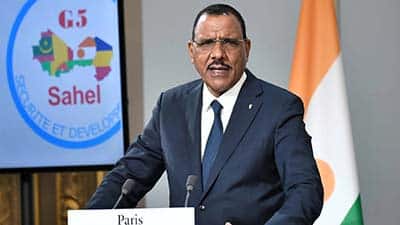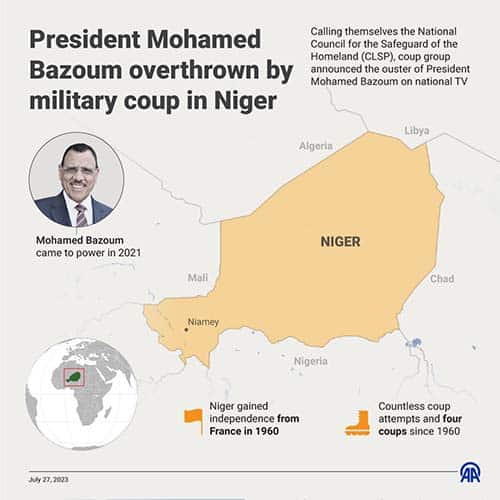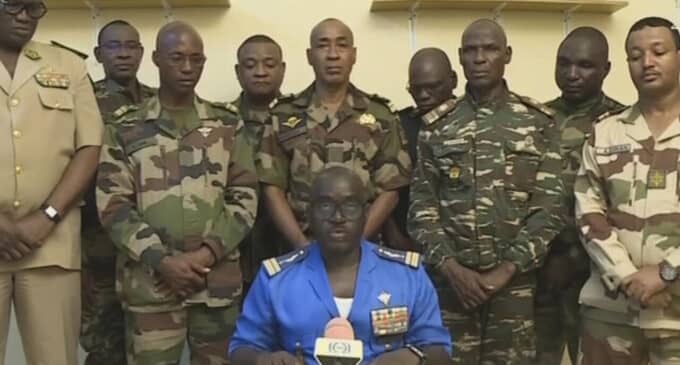It was announced by a group of soldiers in Niger on Wednesday, that they have ousted the country’s democratically-elected President Mohamed Bazoum.
Speaking on a televised address, Colonel-Major Amadou Abdramane said the Niger’s Presidential Guard had detained Bazoum. “This follows the continued deterioration of the security situation, poor economic and social governance,”.
The country’s army command the next day, officially backed soldiers in their coup attempt. And on Friday, General Omar Tchiani was declared the new leader on state TV.
Events that followed
The detained president in a stated on his Twitter account Thursday morning, that Niger’s “hard-won” democratic gains would be safeguarded.
The Foreign Minister Hassoumi Massoudou had called on “all democrats and patriots” to make this “perilous adventure” fail. In an interview with France24, he followed that the democratically-elected government was still the “legitimate and legal authority” in the country.
“We ask all the fractious soldiers to return to their ranks,” Massoudou said. “Everything can be achieved through dialogue but the institutions of the republic must function.”
In a later statement its chief of staff, the military said it had “decided to adhere to the… declaration” made by soldiers who led the coup.
On the other hand, concerning the Nigerien president safety, the army said Bazoum’s “physical integrity” must be preserved in order to avoid “a deadly confrontation… that could create a bloodbath and affect the security of the population.”

Present situation on the ground in Niger
Abdramane, has said the West African country, Niger’s borders have been closed and that “all institutions” in the country would be suspended.
A curfew has also been imposed from 10 p.m. to 5 a.m., “until further notice.”
The headquarters of Bazoum’s party was torched, and other protesters demonstrated outside the National Assembly.
Pro-coup protesters waved Russian flags and shouted anti-France slogans. Some other demonstrations were against the ouster of Niger’s democratically-elected president.
Later on Thursday, Niger’s Interior Ministry issued a directive on state TV banning public demonstrations.
Reactions from the International Community
The Economic Community of West African States (ECOWAS) — of which Niger is a member— swiftly condemned the coup attempt. Nigerian President Bola Tinubu, who is currently the ECOWAS chair, said in a statement that the regional bloc “will do everything within our powers to ensure democracy is firmly planted.”
Benin’s President Patrice Talon flew into Niamey later on Wednesday after meeting with Tinubu. “All means will be used, if necessary, to restore constitutional order in Niger, but the ideal would be for everything to be done in peace and harmony,” Talon told reporters ahead of his trip.
Meanwhile, UN Secretary-General Antonio Guterres said the UN wholeheartedly condemned what he called an “assault against the democratically-elected government” in Niger.
“There are military regimes in Mali, in Burkina Faso and now in Niger, a fragile transition in Chad and an awful situation in Sudan. We are seeing the entire belt south of the Sahara become an incredibly problematic region,” said Guterres, warning that the trend could have terrible consequences for peace efforts as well as for the civilian population.
US Vice President Kamala Harris had a call with Nigeria’s Tinubu, which the White House described as the highest-level US engagement with Tinubu since his inauguration in May.
Harris “strongly condemned any efforts to seize power by force,” and emphasized that the “substantial” US cooperation with Niger was contingent on its “continued commitment to democratic standards,” according to a White House statement.
The foreign minister of Niger’s former colonizer France, Catherine Colonna, condemned “all attempts to take power by force.”
Berlin also called for Bazoum to be released. “Violence is not a means to enforce political or personal interests,” the German Foreign Ministry said in a statement on Thursday.
Germany has troops in Niger, and the closure of Nigerien airspace has reportedly prevented flights to the Bundeswehr air base in Niamey.
The German army, which has maintained a presence in neighboring Mali since 2013, was recently ordered out of the country along with other UN peacekeepers by Mali’s military regime — which also came to power through a coup. The Bundeswehr maintains an airbase in Niger’s capital Niamey that has been serving as a hub for withdrawing troops. Roughly 100 German soldiers are currently stationed in Niger, and another 1,000 remain in Mali. Withdrawal of German troops is scheduled to be completed by December 31.
Russian influence?
Niger is a key Western ally in the turbulent region and observers fear the situation will mean an expansion of Russia’s destabilizing presence there. Although Russian Foreign Minister Sergei Lavrov called for constitutional order to be restored, Wagner militia leader Yevgeny Prigozhin called the incident a strike against “the colonizers.”
Prigozhin, whose Wagner fighters are very active in neighboring Mali and Burkina Faso, framed the overthrow as liberation: “It effectively means winning independence. The rest will depend on the people of Niger, on how efficient they can govern.”
About Niger and the president Mohamed Bazoum

Bazoum was elected president in Niger’s first democratic transition of power in 2021.
He previously served as interior minister and was a right-hand man to former President Mahamadou Issoufou, who voluntarily stepped down after two terms.
The country had seen four other military coups since it gained independence from France in 1960.
Bazoum was one of a dwindling number of pro-Western leaders in the Sahel region which has been rocked by ongoing Islamist insurgency.
“Bazoum has been the West’s only hope in the Sahel region. France, the US and the EU have spent much of their resources in the region to bolster Niger and its security forces,” said Ulf Laessing, head of the Sahel program for Germany’s Konrad-Adenauer-Stiftung think-tank.
Niger is one of the poorest and most unstable countries in the world and frequently ranks near the bottom of the UN’s Human Development Index.
(AFP, AP, Reuters,Wikipedia)

